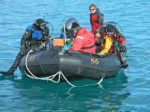Journey to the bottom of the Earth

Bill Baker can be reached at a Colorado phone number, but when the call goes through, it is transferred to a satellite in Palmer Station, Antarctica, where he studies the many chemicals found in local invertebrates. Baker hopes the chemicals can help fight cancer.
Baker, a chemistry professor at USF, made the trip to Antarctica 10 times in the last 15 years in search of new species and the compounds produced by them.
In 2003, Baker and his team found a potential cancer-fighting series of compounds, Palmerolide A, in colonial tunicates, invertebrates Baker describes as “gelatin masses housing hundreds of thousands of individual animals.”
The compound, released by tunicates to ward off potential predators, was enough to require more research from Baker and his team of scientists.
“When we first came across the compound, we thought this might be something, so we began working with its structures and biological properties,” he said. “We then began to look at two types of property chemicals, the ability to kill and the ability to stop advancement.”
Baker sent a sample to the National Cancer Institute, where it was concluded that the compound killed Melanoma cancer cells and stopped the growth of colon, breast and other cancer cells.
After the compound was found to play a role in slowing cancer growth, it was sent to Reata Pharmaceuticals, Inc.
Baker said the discovery of a potential cancer-treating compound is a long process, and as of now, the pharmaceutical company is focusing on testing the compound on mice.
“It’s a complicated pathway from discovery of a molecule to putting it into people,” he said. “Right now it’s being tested on mice, after that we will find out if we need to conduct more studies before it is tried on humans, or we will know if it is a direct transition into distributing it to people.”
Although the test results won’t be known for some time, much of the work will be completed in March when Baker returns with freeze-dried organisms and anti-feeding compounds.
Students help Baker, react to Antarctic lifeOne of Baker’s graduate students, Matt Lebar, returned from Antarctica a few weeks ago. Upon his return, he described the process of getting to Antarctica as a very interesting journey.
“We first took a plane to Punt Arenas, Chile and took a five-day boat ride to Palmer Station, Antarctica, where we had to pass through some of the roughest waters in the world, the Drake Passage,” he said.
A typical day at Palmer Station includes getting up at 6 a.m., participating in a dive if the weather is suitable, spending a couple hours processing whatever was collected during the dive, lunch, diving again and then working with findings until 7 p.m., he said.
Alan Maschek, a graduate student who is still in Antarctica, said his role on the trip is to dive, collect, sort, conduct ecological experiments and examine animals. Maschek also said that life in Antarctica can be very unpredictable.
“Dr. Baker and I were chased from our work by a leopard seal the other day and we were recalled from our dive because the winds jumped 35 knots in 20 minutes,” he said.
Despite the unpredictable environment, Maschek is enjoying his time at Palmer Station.
“The people are all interesting, the food is actually great, there aren’t too many rules, it’s not that cold,” he said. “It’s like an adult summer camp – it’s utterly amazing.”





